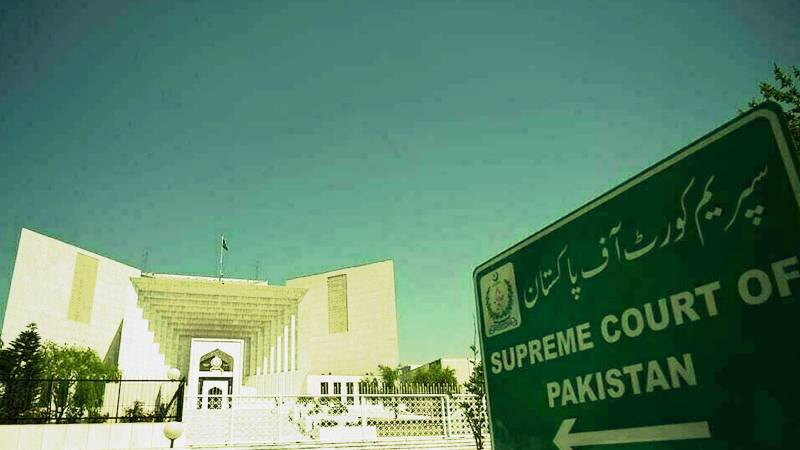
In a major decision that could impact thousands, the Supreme Court on Monday declared the military trials of civilians, especially those alleged to be involved in the incidents of May 9 and 10, to be null and void and that the trial for all such suspects should be held in criminal courts.
The apex court on Monday announced a short order on pleas challenging the military trial of civilians who were involved in the riots which erupted on May 9 and 10 after the detention of Pakistan Tehreek-e-Insaf (PTI) Chairman Imran Khan in a corruption case.
A five-member bench of the apex court, led by Justice Ijaz Ul Ahsan and comprising Justices Munib Akhtar, Yahya Afridi, Sayyed Mazahar Ali Akbar Naqvi, and Ayesha Malik, heard the petitions submitted by the PTI chief and others.
The top court, in a majority decision of four judges to one, declared that Section 2(1)(D) and Section 59(4) of the Pakistan Army Act 1952, are ultra vires to the Constitution.
“It is hereby declared by Mr. Justice Ijaz ul Ahsan, Mr. Justice Munib Akhtar, Mr. Justice Sayyed Mazahar Ali Akbar Naqvi and Mrs. Justice Ayesha A. Malik, that clause (d) of subsection (1) of Section 2 of the Pakistan Army Act, 1952 (in both of its sub clauses (i) & (ii)) and subsection (4) of Section 59 of the said Act are ultra vires the Constitution and of no legal effect,” the top court ruled.
The top court further ruled that the trial of civilians and the accused, numbering around 103, and all other people who are now or may at any time be similarly placed in relation to the events arising from and out of May 9 and 10, 2023, shall be tried by the criminal courts of competent jurisdiction established under the ordinary and / or special law of the land in relation to such offences of which they may stand accused.
"It is further declared that any action or proceedings under the Army Act in respect of the aforesaid persons or any other persons so similarly placed (including but not limited to trial by Court Martial) are and would be of no legal effect,” the top court ruled.
However, Justice Yahya Afridi has reserved the judgment regarding Sections of Army Act that are declared ultra vires of the Constitution.
Earlier, the Supreme Court had reserved the verdict after Attorney General of Pakistan (AGP) Mansoor Usman Awan concluded his arguments about the authority and jurisdiction of military courts to try civilians under the Pakistan Army Act 1952.
Lawyer Salman Akram Raja, who was representing some of the petitioners, told the bench at the commencement of Mondays hearing that trial of civilians in military courts had already started prior to the apex court's decision in the case.
In response, Justice Ahsan stated that the mode of conducting the case will be decided after Attorney General of Pakistan (AGP) Mansoor Usman Awan finishes his arguments.
While presenting his arguments, the AGP stated that he would explain to the court why the establishment of military courts in 2015 to trial terrorists was required by constitutional amendment.
In response to Justice Ahsan's question, AGP Awan stated that both local and foreign nationals were among the accused who were put on trial in military courts.
He said the accused would face justice under Section 2(1)(D) of the Official Secrets Act, and a criminal case would be fully satisfied by a trial conducted under the Army Act.
"The accused's trial in May 9 incidents will follow procedures of the criminal courts," the AGP stated.
The AGP added that because terrorists were beyond the purview of the Army Act, the 21st Amendment was passed.
“If an amendment was required for the trial of terrorists, why is one not essential for civilians?” Justice Ahsan asked. "Did the accused target the army or installations at the time of the 21st constitutional amendment?"
AGP Awan responded that there was a clause in the 21st Amendment requiring those who were accused of assaulting restricted places to stand trial.
"How does the Army Act apply to civilians?" The AGP was questioned by Justice Ahsan.
Justice Malik asked AGP Awan to explain what Article 8 of the Constitution says.
“According to Article 8, legislation against fundamental rights cannot be sustained,” the AGP responded.
The purpose of the Army Act, according to Justice Malik, was to create discipline among the armed services. "Is it possible to apply the military's code of discipline to civilians?" she asked.
The AGP responded by saying that the discipline of the forces is an internal matter while obstructing the armed forces from discharging duties is a separate issue.
He added that trials in military tribunals will be available for anyone facing accusations under the Army Act.
Justice Ahsan stated, "The laws you [AGP] are referring to are related to army discipline."
Justice Malik inquired whether the provision of fundamental rights should be left to the will of Parliament. She said, "The Constitution guarantees the provision of fundamental rights at all costs."
After hearing the arguments, the bench reserved the verdict on the petitions.

